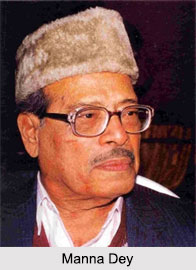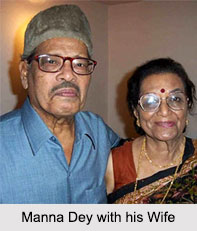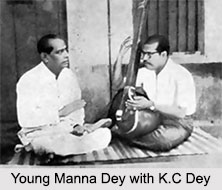 Manna Dey, original name Prabodh Chandra Dey, is one of the most popular and celebrated playback singers. This internationally acclaimed playback singer is also a music director, musician and Indian classical vocalist. He was dominant both in Bengali and Hindi film industry. Apart from that, he also did playback singing in other regional languages like Bhojpuri, Magadhi, Maithili, Punjabi, Assamese, Oriya, Konkani, Sindhi, Gujarati, Marathi, Kannada, Malayalam, and Nepali etc. His peak period in Hindi playback singing was from 1953 to 1976. His tryst with music started quite early with his paternal uncle Sangeetacharya K. C. Dey. Manna Dey was awarded with Padma Shri and Padma Bhushan. Manna Dey died on 24th October 2013 at the age of 94 years due to a cardiac arrest in Bengaluru.
Manna Dey, original name Prabodh Chandra Dey, is one of the most popular and celebrated playback singers. This internationally acclaimed playback singer is also a music director, musician and Indian classical vocalist. He was dominant both in Bengali and Hindi film industry. Apart from that, he also did playback singing in other regional languages like Bhojpuri, Magadhi, Maithili, Punjabi, Assamese, Oriya, Konkani, Sindhi, Gujarati, Marathi, Kannada, Malayalam, and Nepali etc. His peak period in Hindi playback singing was from 1953 to 1976. His tryst with music started quite early with his paternal uncle Sangeetacharya K. C. Dey. Manna Dey was awarded with Padma Shri and Padma Bhushan. Manna Dey died on 24th October 2013 at the age of 94 years due to a cardiac arrest in Bengaluru.
Early Life of Manna Dey
Manna Dey was born on 1st May 1919 in Kolkata to Purna Chandra and Mahamaya Dey. He received his early education from a pre-primary school named Indu Babur Pathshala and thereafter he attended Scottish Church Collegiate School and Scottish Church College in Kolkata. He later graduated from Vidyasagar College. In his childhood, Manna Dey was very much occupied with sports like wrestling and boxing. He excelled in both the games. His days at Scottish Church College were his heydays; he entertained his companions with his tuneful voice. And by the time, he started receiving training under the great tutelage of his uncle, Krishna Chandra Dey, and Ustad Dabir Khan. Then, Manna Dey had already started participating in competitions. For three successive years, he took part in three different categories of inter-collegiate singing competitions and every time fetched the first position.
 Career of Manna Dey
Career of Manna Dey
It was in 1942 when Manna Dey accompanied Krishna Chandra Dey to Mumbai. There he started working as an assistant under Krishna Chandra and then under Sachin Dev Burman. Later on he achieved the honour of being the assistant to noted music composers as well. But soon enough he started working independently and began composing music for many successful Hindi films. Simultaneously, he underwent training from Ustad Aman Ali Khan and Ustad Abdul Rahman Khan in Hindustani Classical music. In 1943, Dey got his first offer as a playback singer in the film "Tamanna". He sang a duet with Suraiya and the music of the song was given by his uncle Krishna Chandra Dey. The song became a hit and Manna Dey was a star overnight.
Later, in 1950, Manna Dey sang for the movie, "Mashal". He sang the song `Upar Gagan Vishal` under the music direction of Sachin Dev Burman. In 1952, he lent his voice for a Bengali and a Marathi movie. Both the movies were made with the same name and storyline- "Amar Bhupali". The movie placed him on the seat of a leading playback singer. Along with the legendary Bhimsen Joshi, he recorded a popular duet, "Ketaki Gulab Juhi". At a much later stage he also sang duets of different genres like, "Yeh Dosti Hum Nehi Torenge" (Sholay) and "Ek Chatur Naar" (Padosan) along with Kishore Kumar. He worked with Hemant Kumar in Bengali films also. Manna Dey can be justifiably said to have pioneered a new musical genre in Indian music wherein Indian classical is blended with pop culture. He has also left a lasting impression on Rabindra Sangeet and Nazrul Geeti. There are several songs of Rabindranath and Nazrul which he sang. Till date, he has recorded more than 3500 songs.
Filmography of Manna Dey
Manna Dey has done playback singing in several films, some of which are:
| Year | Films |
| 1942 | Tamanna |
| 1943 | Ramrajya |
| 1944 | Jwar Bhata |
| 1944 | Kavita |
| 1944 | Mahakavi Kalidas |
| 1945 | Vikramaditya |
| 1946 | Prabhu Ka Ghar |
| 1946 | Valmiki |
| 1947 | Geetgobind |
| 1951 | Awaara |
| 1953 | Do Bigha Zamin |
| 1953 | Hamdard |
| 1953 | Parineeta |
| 1953 | Chitrangada |
| 1954 | Boot Polish |
| 1955 | Shree 420 |
| 1955 | Seema |
| 1956 | Chori Chori |
| 1957 | Do Aankhen Barah Haath |
| 1961 | Kabuliwala |
| 1963 | Dil Hi To Hai |
| 1965 | Waqt |
| 1965 | Chemmeen (Malayalam) |
| 1966 | Love in Tokyo |
| 1966 | Teesri Kasam |
| 1966 | Pyar Kiye Ja |
| 1967 | Upkaar |
| 1967 | Raat Aur Din |
| 1967 | Aamne Samne |
| 1967 | Palki |
| 1967 | Nawab Sirajdoula |
| 1967 | Boond Jo Ban Gaya Moti |
| 1968 | Padosan |
| 1968 | Mere Huzoor |
| 1968 | Neel Kamal |
| 1968 | Ram aur Rahim |
| 1969 | Ek Phool Do Mali |
| 1969 | Chanda Aur Bijli |
| 1969 | Jyoti |
| 1970 | Mera Naam Joker |
| 1970 | Anand |
| 1971 | Johar Mehmood in Hong Kong |
| 1971 | Jane Anjane |
| 1971 | Lal Patthar |
| 1971 | Buddha Mil Gaya |
| 1971 | Paraya Dhan |
| 1971 | Reshma Aur Shera |
| 1972 | Bawarchi |
| 1972 | Seeta Aur Geeta |
| 1972 | Shor |
| 1972 | Zindagi Zindagi |
| 1973 | Avishkaar |
| 1973 | Dil Ki Rahe |
| 1973 | Hindustan Ki Kasam |
| 1973 | Sampurna Ramayan |
| 1973 | Saudagar |
| 1973 | Zanjeer |
| 1973 | Bobby |
| 1974 | Resham ki Dori |
| 1974 | Us Paar |
| 1975 | Sholay |
| 1975 | Himalaya Se Ooncha |
| 1975 | Sanyasi |
| 1975 | Ponga Pandit |
| 1975 | Jai Santoshi Ma |
| 1976 | Das Mnambati |
| 1976 | Mehbooba |
| 1977 | Amar Akbar Anthony |
| 1977 | Anurodh |
| 1977 | Minoo |
| 1978 | Main Tulsi Tere Aangan Ki |
| 1978 | Satyam Shivam Sundaram |
| 1978 | Jurmana |
| 1980 | Abdullah |
| 1980 | Choro Ki Baraat |
| 1980 | Karz |
| 1981 | Kranti |
| 1981 | Laawaris |
| 1990 | Prahaar |
| 1997 | Guria |
| 2008 | Umar |
 Recognitions to Manna Dey
Recognitions to Manna Dey






